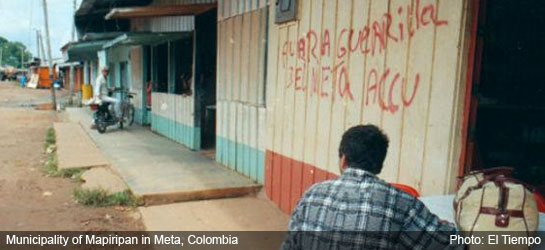
Colombia must pay damages to all victims and alleged “false victims” of a 1997 massacre, the Inter-American Court of Human Rights (IACHR) said Thursday.
The IACHR denied the state’s request to revoke a 2009 ruling requiring the government to pay compensation to victims of the atrocity, in which paramilitaries used chainsaws and machetes to murder villagers in Mapiripan, Meta department, in collaboration with the Colombian army.
The court said evidence provided by the government regarding “false victims” – people originally thought to have died in the massacre but later discovered to have died in other circumstances or still be alive – was “incomplete” and “illegible”.
It blamed the Colombian government for all inconsistencies in the case, stating, “The Tribunal notes that in reality doubts exist around how these people died or disappeared, according to the conclusions of the (Colombian) Prosecutor General. Nonetheless, the Court points to the precise characteristics of the massacre and the inefficiency of the (state’s) internal investigations, established in the sentence itself, in which they failed to fully identify victims.”
The state’s request to recognize Omar Patiño Vaca and Eliecer Martinez Vaca as “false victims” was denied. It alleged Patiño Vaca had turned up as a guerrilla in 2002 and Martinez Vaca was assassinated by a subversive group in 2001. But documentation supporting these allegations was, according to the court, “incomplete, illegible paperwork, (which) in some cases, did not include witnesses’ signatures.”
The court gave the government 90 days to substantiate its claims. But even when alleged victims could be effectively and solidly demonstrated to be “false”, the state must still pay compensation, said the court. The government had previously accepted its failure to properly investigate events and agreed to pay compensation regardless — so it now had a duty to do so, no matter what was later discovered.
It was a resounding loss for Colombian President Juan Manuel Santos and his government, who had called the 2009 ruling a “mockery of the international human rights system”, and accused victims’ relatives and their lawyers of a “shameless conspiracy to defraud the Colombian state.”
Legal action would still be taken against those who illegitimately received compensation, according to government sources cited by newspaper El Tiempo. International law experts said the IACHR judgement did not preclude this, according to the newspaper.
The Colombian defense minister, Juan Carlos Esguerra, visited the IACHR in Costa Rica Wednesday to ask them to rethink the original ruling, which ordered the government to pay $8 million compensation to alleged victims.
Following an admission earlier this year by one witness that she had lied in her testimony, Colombia’s prosecutor general carried out a fresh investigation which concluded only ten people, not 49 as originally estimated in the verdict, could be confirmed dead.
The IACHR and victims’ lawyers pointed out that establishing the exact figure number of people killed and verifying their identities was close to impossible, as many victims were chopped up and thrown in a river.
Carlos Castaño, the founder and highest commander of the paramilitary umbrella organization AUC, which carried out the attack, also publicly admitted that at least 49 people were killed.

